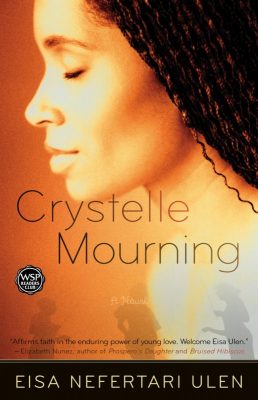 Reviews for Crystelle Mourning
Reviews for Crystelle Mourning
“Affirms faith in the enduring power of young love. Welcome Eisa Ulen.”
~ Elizabeth Nunez, author of Prospero’s Daughter and Bruised Hibiscus
“Lovely and earth scorching.”
~ Tayari Jones, author of Leaving Atlanta and Silver Sparrow
“Her voice has the beauty and economy of poetry.”
~ Jeffery Renard Allen, author of Rails Under My Back and Holding Pattern
“In Crystelle Mourning not only are we given the gift of an inspiring main character and her journey forward and back, but also the pleasure of experiencing a first-time novelist, with so much promise, burst upon the scene.”
~ Kevin Powell, author of Open Letters to America and Someday We’ll All Be Free
“…a rhythmic flow of words and descriptive detail…” ~ Uptown Magazine
“Ulen wisely takes her time revealing Crystelle’s pain, creating an authentic quality to her story.” ~ Essence
“Brilliant and beautifully-written prose” ~ Midwest Book Review
“This novel is beautifully written, replete with complex characters and rich imagery.”
~ Speak EZ Online Magazine
“Ulen lovingly conjures a world of double-dutch and hair braiding on the stoop, hot sweaty basement parties and home-cooked meals. She takes the reader back to a time when a child’s greatest concern was trying to get home before the streetlights came on. Her tenderness and care produce the book’s warm, nostalgic feel and keep the action and the characters from descending into cliche. Ulen uses Crystelle and her plight as a call for healing in the African American community from generations of hurt and neglect. Release, forgiveness, embracing the present and letting love flow are the themes of this novel, and for that it is worth the read.”
~ The Washington Post
“Crystelle Mourning is a nostalgic tale, filled with descriptions of an urban street lined with row-homes where old folks sit on porches, little girls jump double dutch, and boys play ball. Crystelle describes the old women who swept the fronts of their homes as having flab that hung and “wobbled to the beat from arms fattened by the same tradition of genius that turned the feet of a pig into a culinary classic,” (It is the wonderful quotability of Crystelle Mourning that makes reading it twice worthwhile).
“Crystelle Mourning is an urban story with an inner-city setting, gun violence, murder, and African-American characters. It has many of the typical qualities of urban fiction and yet it is anything but typical. Ulen has written this story as literature. It was not written to be consumed quickly and then discarded, leaving only a faint memory that is later confused with the plots of urban novels read before. Crystelle Mourning was written to leave an indelible impression on the reader, not unlike the impression Jimmie leaves on Crystelle.”
~ Smart Black Books
“While Crystelle is unable to forget Jimmie, she is also called upon to remember her childhood in West Philly and realize the impact that it has had on her person. In a similar manner, the readers are asked to remember the lives and traditions of early African Americans as they struggled for survival in the United States. For both Crystelle and the Black race, these acts of remembrance are key to maintaining balance in an unsteady world that can strip you of your love, your life and your freedom.
“Remembrance is also necessary to help maintain the rhythm of life. Ulen is most creative in illustrating that life is about its rhythm. There is a rhythm in the way Black people live and love, a rhythm in Black men’s swagger; there is even a rhythm in the way young Crystelle’s beads move when she wears braids. Crystelle’s grandfather tells her boyfriend, “Ain’t nothing’ new, man. The old sounds just layer the new.” This wisdom points to the evolution of hip hop music from jazz and blues rhythms. Moreover, it points to the steady beat of history’s march into the present. Crystelle’s childhood experiences are highly influential in the way she lives her life as a grown woman.
“Similarly, the manner in which African Americans live their present lives is due in large part to the experiences, good and bad, that they had during the past of enslavement. While Ulen calls for audiences to remember the past and recognize the rhythms of life, she is also calling for forward movement. Crystelle should not forget Jimmie, but she — along with the Black race — will only be able to stop mourning and move toward the future if she is able to release the past.”
~ Hip Hop Literature
“These characters draw breath and interact with a flow and grace unlike so many novels published today — A marvelous read.”
~ Robert Fleming in Black Issues Book Review’s Blacks & Books